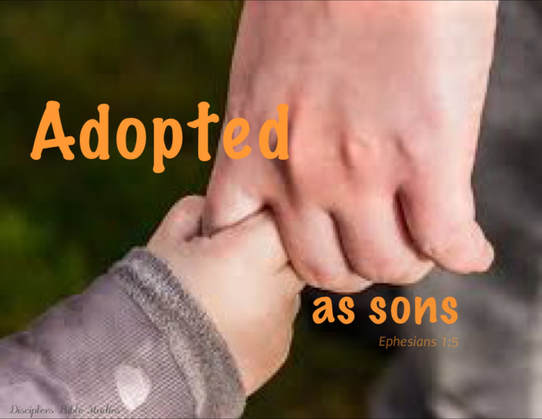 What thoughts come to mind when you think of the word “adoption”? To me, “adoption” is a word of the heart. I believe that the motivation for most people who consider adoption is love. They have love to give and they long to give it to a child who needs it. When we adopted our daughter Amanda, it was because of love. When two of our sons and their wives adopted children, it was because of love. The Bible tells us that as believers, God adopted us and that He adopted us in love, a love far beyond our human understanding. In Ephesians Chapter 1, as Paul lists our spiritual blessings in Christ, the third one is adoption as sons. In Ephesians 1:4-5, the apostle Paul wrote, In love He [God] predestined us to adoption as sons through Jesus Christ to Himself, according to the kind intention of His will. It was because of His love for us that God chose to adopt us into His family. Later in his letter to the Ephesians, Paul reminds us that before we were adopted we were aliens and strangers. We had no hope and were without God in the world (Ephesians 2:12), but Jesus Christ, through His blood (2:13), broke down the wall that separated us from God so we would no longer be strangers, but members of the household of God (2:14, 19). In his letter to the Galatians Paul explained, ….when the fullness of the time came, God sent forth His Son, born of a woman, born under the Law, in order that He might redeem those that were under the Law, that we might receive the adoption as sons (Galatians 4:4-5). The apostle John proclaimed, Behold what manner of love the Father has bestowed on us, that we should be called children of God (1 John 3:1). We, as believers, are objects of God’s love and have received the adoption as sons, as one of our precious spiritual blessings in Christ. In his letter to the Romans Paul wrote, For you have not received a spirit of slavery leading to fear again, but you have received a spirit of adoption as sons by which we cry out, ‘Abba! Father’ (8:15). We are blessed with an intimate relationship with God the Father. In the ancient world, the purpose of adoption was to preserve the family by providing an heir. The Greek word “huiothesia”, which Paul used, means to "place as a son". Under Jewish law there was no provision for adoption. When a man died without a son to continue his family line, his closest male relative was to marry the widow and produce an heir (the law of levirate marriage). So Paul’s term, adoption as sons, is not a reflection of Jewish law, but a metaphor reflecting Roman law that allowed a man to provide an heir from outside his family. An adopted son was released from any debts or previous obligations and, as an heir, received all the rights, privileges, and responsibilities of sonship. In Romans 8:14–17, Paul wrote that as God's adopted sons, we become His heirs (see also Ephesians 1:11, 14). If we are His children, then we are heirs--heirs of God and co-heirs with Christ (Romans 8:17). Furthermore, according to Roman law, a naturally born baby could be disowned from the family. But an adopted a child was chosen as a family member and, according to law, could not be disowned. He was a permanent member of the family. As believers, we are God’s heirs and will never lose that privilege. Paul’s term adoption as sons reflects another wonderful truth. At first glance, you may think he is leaving women out or slighting them when he doesn’t write “children” or “sons and daughters”, but that is not the case at all. In his letters to the churches, Paul always includes all believers, both men and women. In Galatians 3:28 he wrote, there is neither Jew nor Greek, there is neither slave nor free man, there is neither male nor female; for you are all one in Christ Jesus. There is no partiality with God. When God adopts us into His family, we all receive the rights of sons. This is important because in the Roman world, although female citizens had certain limited rights, they were far less than those of a man. Girls were rarely adopted because they did not provide a political advantage nor could the family line be carried on through them. But when we are adopted into God’s family we all are given equal rights! We all have the rights of sons! So far in his letter to the Ephesians, Paul has written that God has chosen us to be His (1:4) and predestined us (1:5) to be adopted as sons. It is not because of who we are or what we have done or anything we could ever do for Him. He adopted us because He loves us. Behold what manner of love the Father has given unto us, that we should be called the sons of God (1 John 3:1). Are you a grateful for this blessing of sonship? How does your life reflect your sonship? With love as your sister in Christ, Suzie
1 Comment
 In reading through the Old Testament, we find many instances referring to God as being the “portion” of His people. God told Aaron, at his consecration as high priest, that he would have no portion among the people. He told Aaron, "I am your portion and your inheritance among the sons of Israel" (Numbers 18:20). The Book of Deuteronomy tells us that the tribe of Levi (the priestly tribe) did not have a portion or inheritance with his brothers for the LORD was his portion (10:9). David prayed in Psalm 73:26, God is the strength of my heart and my portion forever, and Jeremiah wrote, "The LORD is my portion", says my soul, therefore I have hope in Him (Lamentations 3:24). Portion is an archaic word that was used to denote one’s destiny. Have you ever thought about your destiny, what your portion is in this world and what the future will bring? Do you believe you have a destiny? The reason I ask is because the spiritual blessing we’re going to talk about this week is predestination. Ephesians 1:5 says God predestined us [believers] to adoption as sons through Jesus Christ to Himself, and 1:11 tells us that we have obtained an inheritance, having been predestined according to His purpose who works all things after the counsel of His will. So according to Paul, at least part of our portion (or destiny), as believers today, is to be adopted sons of God, along with obtaining an inheritance in Christ. We'll look into the blessings of adoption as sons and our inheritance in future blogs. So what does it mean to be predestined? To start at the beginning, the word “predestined” is derived the Greek word "pro'horizo". “Pro”, means “beforehand”, and “horizo” means “to mark out boundaries”, “to determine”, or “to decree”. “Horizo” looks forward to our destination, the place we are ultimately trying to reach, the end of our journey, what is out there for us on the horizon. “Pro” means that this destination was determined beforehand. The fact that God predestined us means that somehow, in some way, He determined who would be His child and who would not. He has determined a “destiny” for His children, and He did this, before the foundation of the world (Ephesians 1:4, 5,11). As His children, we can have confidence that all His promises to us in His Word will be fulfilled. Someone has put it this way. God’s will is embedded in our DNA. As God’s children, we can trust our destiny to Him because He is sovereign. He created all things and He has absolute authority over all He has created (Genesis 1:1). God is omniscient. He has knowledge of all things and His knowledge is perfect (Job 37:16). God is omnipotent. He is all-powerful to carry out his plan and purpose throughout eternity (1 Chronicles 29:11). God is omnipresent. He has the ability to be everywhere all the time (Psalm 139:1-12). Most Christians agree that the Bible teaches all of these attributes of God, and we agree that we can be thankful and confidently put our destiny in His hands. However, scholars have put forth two views on the doctrine of predestination that are quite different, and they need to be mentioned here. The first is the “prescient view”. The word “prescient” is made up of the words, “pre” (beforehand) and “science” (to know). So prescient means “to know beforehand”. The prescient view says God knows beforehand who will choose to believe and who will not and He predestines those who believe to be His. According to this view, the decision to believe rests with us. The second is the Augustinian view which says people are not predestined “because” they believe, but are predestined “to” believe. According to this view, the entire decision rests with God. Are you familiar with these two differing doctrines concerning predestination? Do you hold to a certain doctrine of predestination? This is something that requires a committed study of the character of God and our own sinfulness (see Romans 1:16-32). It is a worthwhile study which yields truths that become self-evident as we faithfully study God’s Word. In closing, let’s thank God that according to the kind intention of His will (Ephesians 1:5) He determined beforehand to adopt us as His children and give us an inheritance as part of His family (1:11). What greater blessing than to be God’s adopted sons and daughters -- to be "washed in the fountain, cleansed by His Blood! Joint heirs with Jesus as we travel this sod,…. part of the family of God" (Bill Gaither). It is our destiny that God is our portion. Our strength and our hope are in Him who is sovereign over all things, all-powerful, all-knowing, and ever present with us. Praise the Lord! Enjoy your blessings, Suzie P.S. If you would like to delve deeper into the different views of predestination, I recommend this video as a good place to begin. http://www.ligonier.org/learn/series/predestination/what-is-predestination/ |
SUZIE KLEIN
I have been involved in Disciplers since 1987, as a discussion leader, teacher, writer, and now as director. I am profoundly committed to the stewardship of this ministry which God has entrusted to me for a time. God’s word is the chief joy of my life. I cherish my personal time in the word, and I am filled with gratitude to be able to share His word with you, my fellow disciples in Christ. Categories |

 RSS Feed
RSS Feed